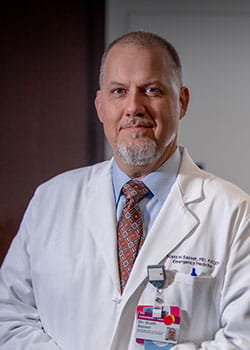About
Scott Sasser, MD, FACEP, joined University Hospitals in August 2022 as Chief Physician Executive, President, University Hospitals Medical Group (UHMG), and President, University Hospitals Physician Services (UHPS). In this role, he is a key member of the Enterprise Leadership Team, leading strategic and operational initiatives to include practice management; physician recruitment, retention and leadership development; optimization of contemporary compensation models; access to care; and medical staff services. He is a key partner with the Enterprise Executive Operations Committee (EEOC) in ensuring that the disparate parts of University Hospitals operate as one unified system.
An accomplished health care system executive, Dr. Sasser has extensive experience in medical group leadership, clinical operations, global and public health, and academic medicine. Throughout his career he has served in a variety of roles, including department Chair, Chief Clinical Officer, and Chief of Medical Staff Affairs. Prior to joining UH, he most recently served as Chief Executive Officer of the 3,300 member Prisma Health medical group in South Carolina, where he also served as Professor of Emergency Medicine at the University of South Carolina School of Medicine and at the Clemson University School of Health Sciences Research.
Dr. Sasser has spent much of his academic career focused on strengthening prehospital and hospital based injury care-globally and nationally, and he has received funding from the Centers for Disease Control and Prevention (CDC), Federal Emergency Management Agency, United States Agency for International Development, and the National Institutes of Health Fogarty International Center. Dr. Sasser previously worked at Emory University School of Medicine, where he and his team provided subject matter expertise to governments and academic institutions in the Mozambique, Rwanda, the Republic of Georgia, and India to improve public health education, clinical care and training, and systems of care for emergency medical services, trauma, and emergency medicine.
Dr. Sasser has served on multiple panels, committees, and boards, has lectured at multiple national and international venues, and served as the founder and president of a health care nonprofit. He was the lead editor on the World Health Organization’s instrumental publication on prehospital trauma care systems and was the lead author on two influential Morbidity and Mortality Weekly Reports (MMWR) that provided guidance on the field triage of injured persons that has been endorsed and adopted by multiple national organizations and states across the country. In recognition of his service, he has received the Healthcare Transformation Award from the Greenville Community Foundation for his leadership in the response to COVID-19 and the Honor Award for Excellence in Volunteer Service from the CDC’s National Center for Injury Prevention and Control for leadership and volunteer efforts to open a pediatric clinic in Rwanda.
Dr. Sasser graduated from Auburn University and earned his medical degree at Tulane University School of Medicine in New Orleans. He completed residency training in emergency medicine and fellowship training in emergency medical services at Atrium Health in Charlotte, NC and has lived and worked in Eastern Europe and the Middle East. Dr. Sasser and his wife, Kelli Cox Sasser, reside in University Circle. They have four adult children.
Health research keywords
University Hospitals Health System, Emergency Medical Services, Disaster Planning, Trauma Centers, Mass Casualty Incidents,Hospital Administration, World Health, Public Health, Wounds and Injuries

